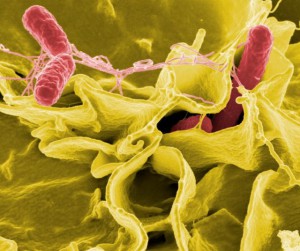Herbicides, including glyphosate, increase antibiotic resistance in E. coli and Salmonella
A new study in mBio, a peer-reviewed journal published by the American Society for Microbiology, suggests that the herbicides dicamba (Kamba), 2,4-dichlorophenoxyacetic acid (2,4-D) and glyphosate (Roundup) induce antibiotic resistance in E. coli and Salmonella bacteria. Researchers subjected bacteria to combinations of different herbicides and antibiotics, including antibiotics commonly used to treat bacterial infections in humans such as ampicillin, ciprofloxacin, and tetracycline. The results demonstrated that E. coli and Salmonella exposed to low levels of Kamba, 2,4-D and glyphosate were more resistant to antibiotics than bacteria only exposed to antibiotics. Bacteria exposed to the commonly used herbicides activated proteins enabling them to rid themselves of toxic substances creating a defense against the antibiotics. The authors conclude that the common use of chemicals in agriculture, gardens, and public spaces can induce resistance to multiple antibiotics in bacteria that are harmful to humans. Furthermore, “The combination of high use of both herbicides and antibiotics in proximity to farm animals and important insects, such as honeybees, might also compromise their therapeutic effects and drive greater use of antibiotics.”




